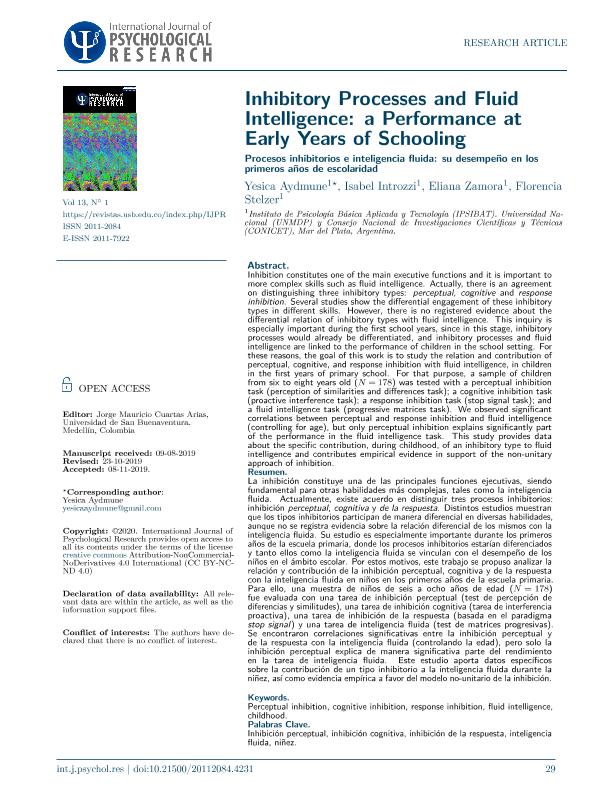Artículo
La inhibición constituye una de las principales funciones ejecutivas, siendo fundamental para otras habilidades más complejas, tales como la inteligencia fluida. Actualmente, existe acuerdo en distinguir tres procesos inhibitorios: inhibición perceptual, cognitiva y de la respuesta. Distintos estudios muestran que los tipos inhibitorios participan de manera diferencial en diversas habilidades, aunque no se registra evidencia sobre la relación diferencial de los mismos con la inteligencia fluida. Su estudio es especialmente importante durante los primeros años de la escuela primaria, donde los procesos inhibitorios estarían diferenciados y tanto ellos como la inteligencia fluida se vinculan con el desempeño de los niños en el ámbito escolar. Por estos motivos, este trabajo se propuso analizar la relación y contribución de la inhibición perceptual, cognitiva y de la respuesta con la inteligencia fluida en niños en los primeros años de la escuela primaria. Para ello, una muestra de niños de seis a ocho años de edad (N = 178) fue evaluada con una tarea de inhibición perceptual (test de percepción de diferencias y similitudes), una tarea de inhibición cognitiva (tarea de interferencia proactiva), una tarea de inhibición de la respuesta (basada en el paradigma stop signal) y una tarea de inteligencia fluida (test de matrices progresivas). Se encontraron correlaciones significativas entre la inhibición perceptual y de la respuesta con la inteligencia fluida (controlando la edad), pero solo la inhibición perceptual explica de manera significativa parte del rendimiento en la tarea de inteligencia fluida. Este estudio aporta datos específicos sobre la contribución de un tipo inhibitorio a la inteligencia fluida durante la niñez, así como evidencia empírica a favor del modelo no-unitario de la inhibición. Inhibition constitutes one of the main executive functions and it is important to more complex skills such as fluid intelligence. Actually, there is an agreement on distinguishing three inhibitory types: perceptual, cognitive and response inhibition. Several studies show the differential engagement of these inhibitory types in different skills. However, there is no registered evidence about the differential relation of inhibitory types with fluid intelligence. This inquiry is especially important during the first school years, since in this stage, inhibitory processes would already be differentiated, and inhibitory processes and fluid intelligence are linked to the performance of children in the school setting. For these reasons, the goal of this work is to study the relation and contribution of perceptual, cognitive, and response inhibition with fluid intelligence, in children in the first years of primary school. For that purpose, a sample of children from six to eight years old (N = 178) was tested with a perceptual inhibition task (perception of similarities and differences task); a cognitive inhibition task (proactive interference task); a response inhibition task (stop signal task); and a fluid intelligence task (progressive matrices task). We observed significant correlations between perceptual and response inhibition and fluid intelligence (controlling for age), but only perceptual inhibition explains significantly part of the performance in the fluid intelligence task. This study provides data about the specific contribution, during childhood, of an inhibitory type to fluid intelligence and contributes empirical evidence in support of the non-unitary approach of inhibition.
Inhibitory Processes and Fluid Intelligence: a Performance at Early Years of Schooling
Título:
Procesos inhibitorios e inteligencia fluida: su desempeño en los primeros años de escolaridad
Fecha de publicación:
01/2020
Editorial:
Universidad San Buenaventura
Revista:
International Journal of Psychological Research
ISSN:
2011-2084
e-ISSN:
2011-7922
Idioma:
Inglés
Tipo de recurso:
Artículo publicado
Clasificación temática:
Resumen
Archivos asociados
Licencia
Identificadores
Colecciones
Articulos(IPSIBAT)
Articulos de INSTITUTO DE PSICOLOGIA BASICA, APLICADA Y TECNOLOGIA
Articulos de INSTITUTO DE PSICOLOGIA BASICA, APLICADA Y TECNOLOGIA
Citación
Aydmune, Yésica; Introzzi, Isabel Maria; Zamora, Eliana Vanesa; Stelzer, Florencia; Inhibitory Processes and Fluid Intelligence: a Performance at Early Years of Schooling; Universidad San Buenaventura; International Journal of Psychological Research; 13; 1; 1-2020; 29-39
Compartir
Altmétricas




